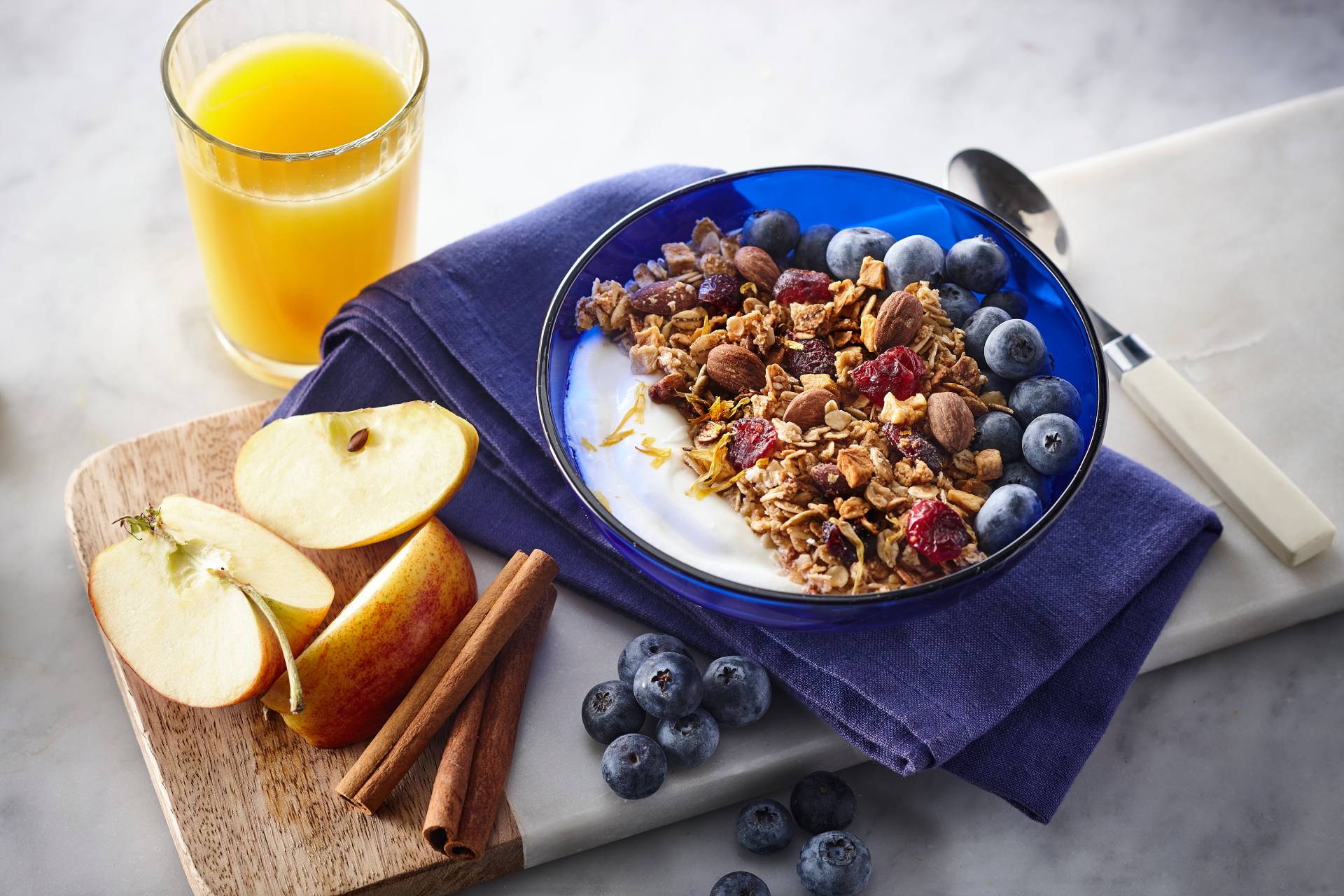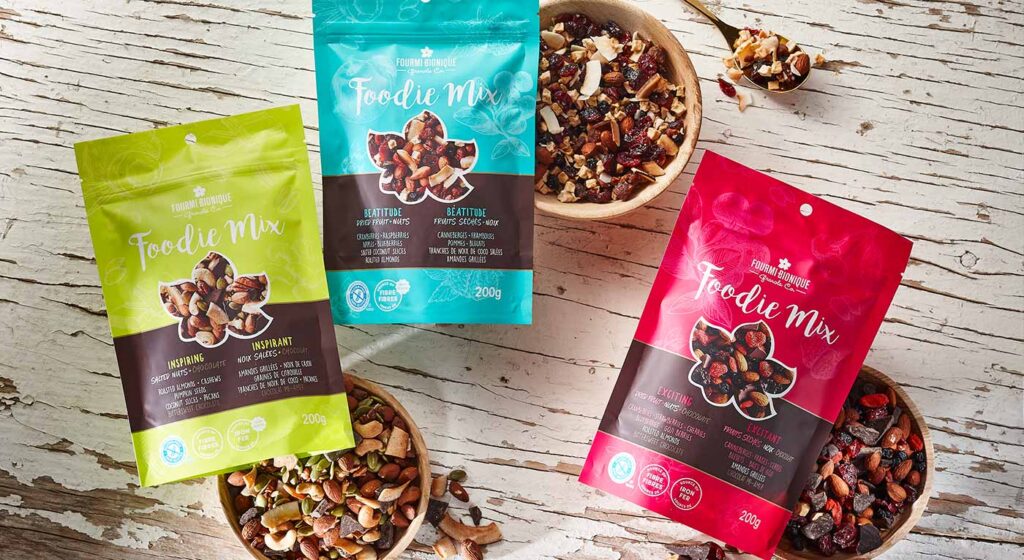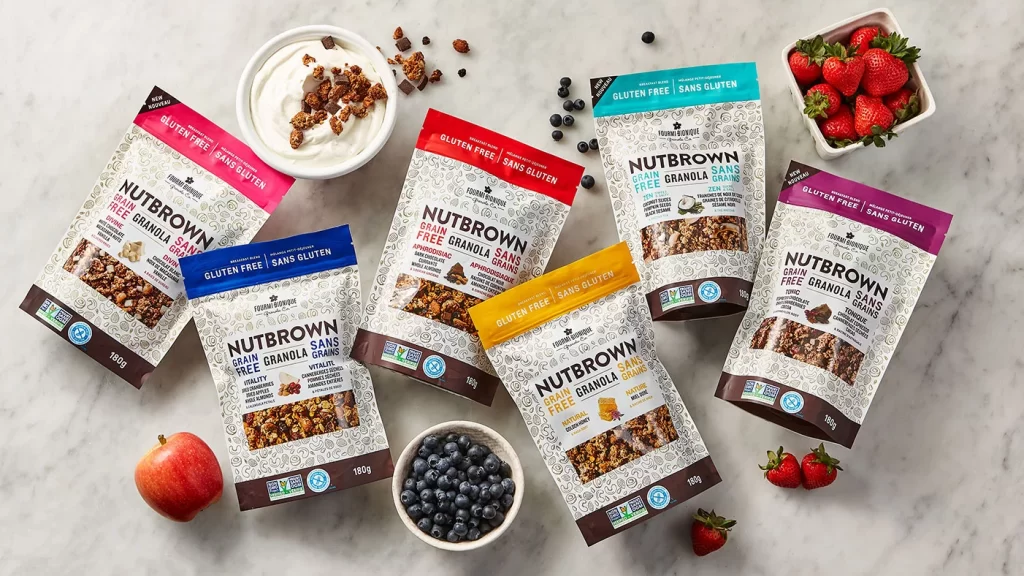It’s a true breakfast star, found on many Canadian tables, today we’re talking about oats! Granola, oatmeal, oat milk, muesli… this cereal with multiple facets and nutritional benefits is very popular. Today, we’re introducing you to our favorite ingredient, without which many of La Fourmi’s products wouldn’t have made it to your kitchen cupboards!
Oats in all their forms
Whether it’s consumed in a solid way via porridge, gruel, granola or muesli, in a liquid way like oat milk or even in powder form with flour or bran, oats is a true source of nutrients. What’s really appreciated with this cereal is that it comes in endless varieties, so that everyone can find the oats that suit them best:
- Porridge is a traditional preparation of oat bran mixed with hot water or milk;
- Oatmeal is obtained from rolled oats mixed with hot water or milk, much like porridge;
- Muesli, granola or even our Müska are a mixture of oats, spices, dried fruits and sugar that can be added to yogurt, milk or eaten on their own!
- Oat milk is a non-dairy milk for those who avoid lactose, a source of intolerance for some;
- Oat flour allows you to create many delicious and healthy recipes, without using the wheat allergen.
Oat cultivation
Canada is one of the top oat exporters in the world, thanks to its ideal climatic conditions (indeed, oats love low temperatures!). At La Fourmi, it’s the organic and local oats that have won over our hearts, and the one with which we wish to please you through our products. Canadians are more and more fond of organic farming, and that’s a good thing! By placing values such as health and the environment at the heart of the process, this enthusiasm is heard by local farmers, with an area of land devoted to organic farming which has doubled in five years. Quebec is now responsible for half of Canadian production.
Oats strengthen the digestive system
The cereal contains a high proportion of soluble and insoluble fibers, which is perfect for intestinal transit. For example, ¼ cup of dry oats contains about 5 grams of dietary fiber. Beta-glucan is one of them, particularly beneficial for health. When it dissolves in water, it forms a thick gel that promotes the growth of healthy bacteria in the gut. It can also help support cardiovascular health and boost the immune system. Finally, the fibers present in large quantities in oats are perfect for treating constipation problems.
Oats help lower cholesterol
A study has shown that oatmeal can help lower bad cholesterol levels. This is because soluble fiber tells the liver to extract low-density lipoprotein – also known as LDL – from the bloodstream, which then sticks to digested oats. These are eventually eliminated from the body as waste. 5-10 grams or more of soluble fiber per day is considered to lower your LDL cholesterol levels. A serving of breakfast cereal with oatmeal or oat bran provides 4-5 grams of fiber. If you add fruit, such as a banana or berries, you’ll get even more fiber, perfect for starting the day off right!

Oats regulate blood sugar
Because fiber is digested slowly, foods high in it, such as oatmeal, can keep blood sugar levels from rising too quickly after breakfast. For instance, a study illustrated that there is indeed “a beneficial effect of oat consumption on glycemic control and lipid profiles in type 2 diabetic patients”. Tip: By eating your fibers first thing in the morning, they effectively coat the small intestine and slow down gastric emptying. Then the glucose (in the starch) from the rest of your breakfast is absorbed to a lesser and smaller extent. It then creates a smaller glucose spike and leads to a better hormonal balance, an improved fertility, fewer cravings, better skin and reduced risk of disease.
Oats are better tolerated by people sensitive to gluten
Many people who are gluten intolerant or suffer from celiac disease ask themselves the question, and the answer remains a bit mixed. Gliadin is the part of gluten in wheat that causes an immune reaction. Oats do not contain gliadin, but another similar molecule, avenin. As they’re quite similar, it has long been attributed to oats the same physiological effects as those caused by wheat. However, more studies show that oats would be tolerated by the vast majority of people with celiac disease. Our advice in case of severe allergy? Either turn to oat-based products from organic farming and guaranteed gluten-free, or choose grain-free products like our Gluten-Free range. Our grain-free Nutbrown granolas are fully certified by the Gluten-Free Certification Program (GFCP), and by the Non-GMO Project Association.
Oats support athletes in their trainings
If athletes consume oatmeal, either in porridge or oat bran pancakes, it’s because of the large amount of carbohydrates, proteins, and essential fatty acids that they provide to the body. The low glycemic index (GI) is also very popular, since it leads to a more stable blood sugar level, which will allow the body to better assimilate carbohydrates. On the contrary, a food with a high GI causes the body to spike insulin, a hormone that stores glucose as fat. If an excess of insulin generally causes an energy crash within 2 hours after the meal, oatmeal gives athletes energy before training and maintains physical effort. Our recipe for gluten-free and organic oatcakes is the perfect post-workout snack, between indulgence and recovery.
The benefits of oats: What you should know
- Canada is one of the top oat exporters in the world;
- Oats from organic farming are widely acclaimed by consumers;
- The wide variety of oat products allow multiple tasting experiences;
- The cereal improves digestion, regulates blood sugar and reduces bad cholesterol;
- It is generally well tolerated by celiac and gluten intolerant people;
- Oats are ideal before sports training, and during recovery.


